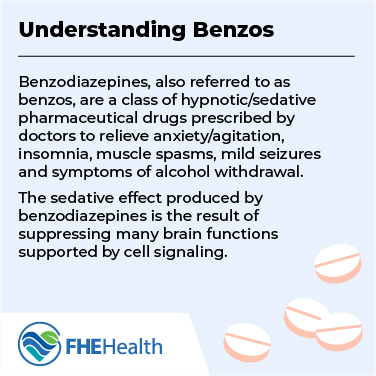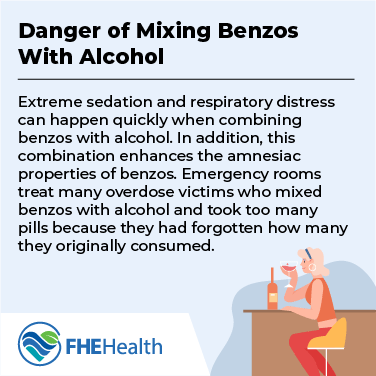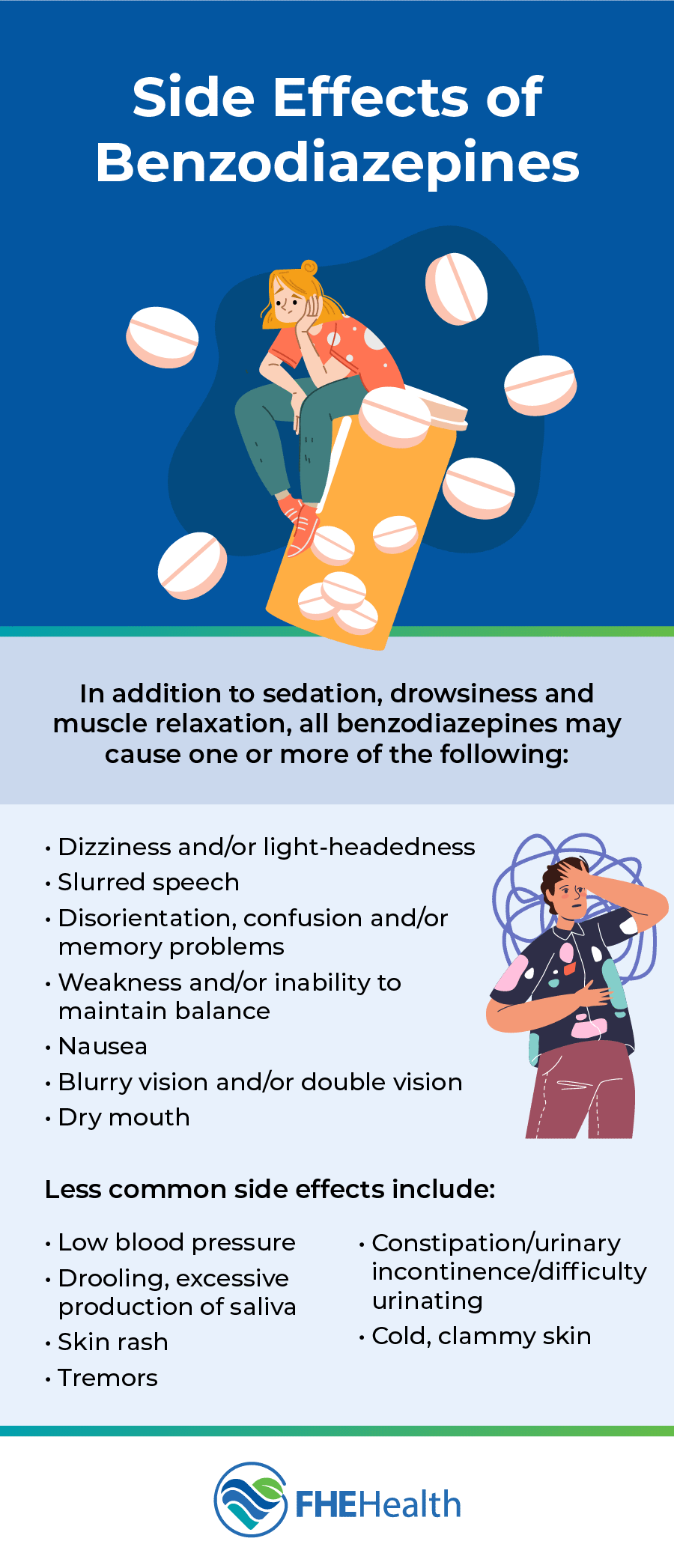Benzodiazepines, also referred to as benzos, are a class of hypnotic/sedative pharmaceutical drugs prescribed by doctors to relieve anxiety/agitation, insomnia, muscle spasms, mild seizures and symptoms of alcohol withdrawal. Dentists and physicians may give patients a benzodiazepine to help calm them before undergoing certain treatments.
By enhancing the effects of the neurotransmitter gamma-aminobutyric acid (GABA) on neurons in the brain, benzodiazepines reduce the communication activity among neurons. The sedative effect produced by benzodiazepines is the result of suppressing many brain functions supported by cell signaling.
Drug Scheduling of Benzodiazepines
 The U.S. Drug Enforcement Agency classifies benzodiazepines as a Schedule IV substance with a “low abuse and dependence potential.” Examples of Schedule IV benzodiazepines include Xanax, Valium, Soma, Darvocet/Darvon and Ativan.
The U.S. Drug Enforcement Agency classifies benzodiazepines as a Schedule IV substance with a “low abuse and dependence potential.” Examples of Schedule IV benzodiazepines include Xanax, Valium, Soma, Darvocet/Darvon and Ativan.
Purchasing benzodiazepines off the street is illegal. If someone is caught in possession of benzodiazepines and cannot show they have a prescription for them, they could be arrested, fined and jailed. Candy, downers, tranks and chill pills are common street names for benzodiazepines.
What are the Different Kinds of Benzodiazepines?
Benzodiazepines such as Xanax, Ativan, Valium, Serax and Librium are prescribed for treating generalized anxiety disorder and severe anxiety.
Benzodiazepines designated as sedative-hypnotics are prescribed for chronic sleep difficulties such as insomnia, somnambulism (sleep-walking) and night terrors. Sedative-hypnotic benzodiazepines include Dalmane, Restoril, Halcion and Prosom.
Clonazepam (brand name Klonopin) and Alprazolam are benzodiazepines given to people with panic disorder, agoraphobia and specific types of seizures. These two types of benzodiazepines stimulate GABA activity differently than Xanax and Valium. Consequently, Klonopin and Alprazolam represent more potent forms of benzodiazepines.
Chlordiazepoxide (Librium) and Diazepam are benzodiazepines given to people undergoing alcohol detoxification. It may also be prescribed for insomnia, anxiety and muscle spasms caused by neurological disorders.
Side Effects of Benzodiazepines
In addition to sedation, drowsiness and muscle relaxation, all benzodiazepines may cause one or more of the following:
- Dizziness and/or light-headedness
- Slurred speech
- Disorientation, confusion and/or memory problems
- Weakness and/or inability to maintain balance when standing or walking
- Nausea
- Blurry vision and/or double vision
- Dry mouth
Less common side effects include:
- Low blood pressure
- Drooling, excessive production of saliva
- Skin rash
- Constipation/urinary incontinence/difficulty urinating
- Tremors
- Cold, clammy skin
Signs of a benzodiazepine overdose involve:
- Hallucinations
- Uncontrollable eye movements (nystagmus)
- Lack of muscle coordination/control (ataxia)
- Amnesia
- Difficulty breathing/dangerously slow breathing
- Shock (hypotension)
- Coma
Overdosing on benzodiazepines demands emergency medical treatment with oxygen therapy and a possible stomach pump procedure. A medication called Flumazenil is sometimes given to overdose patients to help reverse overdose symptoms.
How Dangerous is Mixing Benzos With Alcohol?
 Drinking alcohol while taking benzodiazepines increases your risk of overdosing significantly. Alcohol intensifies activity of GABA and other inhibitory neurotransmitters to heighten side effects of benzos. Extreme sedation and respiratory distress can happen quickly when combining benzos with alcohol. In addition, this combination enhances the amnesiac properties of benzodiazepines. You could forget you took a prescribed dose of Xanax or Valium and take another dose within minutes of swallowing one or two pills. Emergency rooms treat many overdose victims who mixed benzos with alcohol and took too many pills because they had forgotten how many they originally consumed.
Drinking alcohol while taking benzodiazepines increases your risk of overdosing significantly. Alcohol intensifies activity of GABA and other inhibitory neurotransmitters to heighten side effects of benzos. Extreme sedation and respiratory distress can happen quickly when combining benzos with alcohol. In addition, this combination enhances the amnesiac properties of benzodiazepines. You could forget you took a prescribed dose of Xanax or Valium and take another dose within minutes of swallowing one or two pills. Emergency rooms treat many overdose victims who mixed benzos with alcohol and took too many pills because they had forgotten how many they originally consumed.
According to the National Institute on Drug Abuse, benzodiazapine-involved overdose deaths increased nearly 10-fold from 1999 to 2017. In 1999, 1,135 overdose deaths were reported that involved one or more types of benzos. In 2017, the number of overdose deaths involving benzos reached 11,537. The NIDA further reports that deaths attributed to benzos combined with synthetic narcotics and/or alcohol have steadily risen since 2014. However, the number of overdose deaths due to taking benzos without opioids remained relatively the same.
Why are Benzos Addictive?
 Like opioids and stimulants, benzodiazepines increase levels of dopamine, a neurotransmitter implicated in the brain’s reward and pleasure center. After taking Valium, Xanax or Klonopin, your brain experiences a sudden surge of dopamine responsible for the euphoria and deep sense of sedation and relaxation you get within 30 to 60 minutes of taking benzos. Once this feeling wears off, your brain craves another “hit” of dopamine because the experience was so physiologically satisfying.
Like opioids and stimulants, benzodiazepines increase levels of dopamine, a neurotransmitter implicated in the brain’s reward and pleasure center. After taking Valium, Xanax or Klonopin, your brain experiences a sudden surge of dopamine responsible for the euphoria and deep sense of sedation and relaxation you get within 30 to 60 minutes of taking benzos. Once this feeling wears off, your brain craves another “hit” of dopamine because the experience was so physiologically satisfying.
Addiction begins as soon as you start taking more benzos than prescribed. Tolerance develops quickly as you need to take higher doses to feel the same high you originally felt. If a benzo addict stops taking them, withdrawal symptoms and intense cravings often force the addict to start feeding their addiction by trying to find doctors who will write prescriptions for them. When this doesn’t work, a benzo addict may hit the streets to find drug dealers selling illegal benzodiazepines.
Rationalizing a Benzo Addiction
Denial is an unhealthy way to cope with problems that produce unpleasant inner conflict. It is also a kind of emotional repression that protects our need to maintain physiological and psychological stability. Consequently, if you are faced with the fact that you may be addicted to prescription medications like benzos, you may try to deny the addiction by rationalizing the addiction.
Examples of rationalizing away a benzo addiction include:
- I need to take pills because I have chronic anxiety, can’t sleep, etc. You don’t want me to suffer, do you?
- I’m not breaking the law taking pills prescribed by my doctor. I can take as many as I want, and it’s perfectly legal.
- I’m not hurting you or anyone else.
- If you had to deal with what I have to deal with in life, you’d take pills, too!
- I am not addicted! I can stop whenever I choose to stop.
- It’s not like I’m using heroin. Prescription drugs won’t kill me like street drugs can
- It’s not my fault I need my prescriptions. My mental/physical illness isn’t something I wanted!
- No one cares about me, so why should I care?
The powerful need to continue denying their addiction often continues even if an addict experiences incarceration or homelessness. By this time, the brain is suffering serious chemical imbalances that cause thinking patterns to become almost delusional in denying a problem exists. At this point, successfully defeating an addiction to prescription drugs means getting into a recovery program consisting of medical detoxification, cognitive behavioral therapy and professional addiction counseling.
Trying to defeat a benzodiazepine addiction without the help of caring, professional addiction specialists is life-threatening. Attempting to get off benzos by going the cold turkey route is especially dangerous because it leaves benzo addicts at risk for suffering seizures, dehydration, shock and coma. Even reducing the dosage of benzos without medical supervision may worsen panic, anxiety, insomnia symptoms that originally compelled the addict to seek help. This “rebound effect” makes you crave benzos even more for relief of psychological and physical withdrawal symptoms.
Contact FHE Health today if you or someone you know is addicted to benzos or other prescription drug. You can reach a caring staff member by calling (833) 596-3502. Our compassionate team of mental health and addiction counselors are standing by to take your call 24/7.








